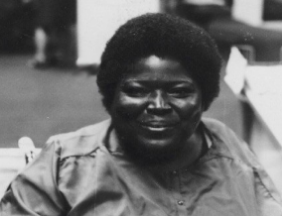For Black History Month, we’re profiling Black leaders in the disability rights movement. Check back all month for more!
Johnnie Lacy was a Black disability rights activist integral to the independent living movement. Through her activism, she brought to light the intersectionality of race and disability and worked to tackle ableism in the Black community and racism in the largely white-dominated disability community.
Born in 1937, Lacy attended segregated elementary schools in the South before her family moved to California when she was 10. In California, she attended integrated schools but continued to feel the effects of informal segregation. At 19, Lacy was diagnosed with polio, which briefly led her to become paralyzed and wheelchair-bound.
Lacy decided to pursue higher education and attend San Francisco State University to study speech-language pathology but faced barriers due to her disability. Simply enrolling was a fight—and Lacy was not allowed to participate in graduation ceremonies or officially be a part of the school. The discrimination she faced only further fueled her determination to become active in the disability rights movement.
Though Lacy spoke of her sense that she didn’t entirely belong in the Black community or the disability community, she refused to let herself be silenced. A passionate advocate for the right of people with disabilities to live independently in the community, she helped found the Berkeley Center for Independent Living in 1981. She later served for more than a decade as the director of the Community Resources for Independent Living (CRIL), a nonprofit in Hayward, CA that provides advocacy, mentoring, and other services for people with disabilities living in southern Alameda County.
Along with her work at CRIL, Lacy served on the California Attorney General’s Commission on Disability, Hayward’s Commission on Personnel and Affirmative Action, and the Mayor’s Disability Council for the city and county of San Francisco. Lacy died in 2010 as a trailblazing champion for disability rights and a powerful voice for Black people with disabilities.
Today we honor her as part of Black History Month.
Sources for this piece include Ramp Your Voice and Independence Now.
Comments are closed.